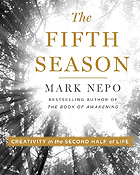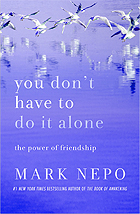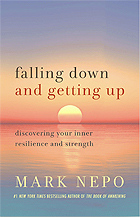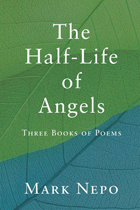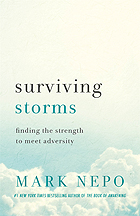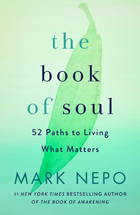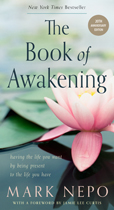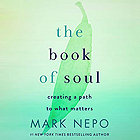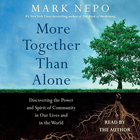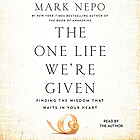| Books |  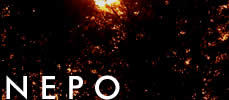  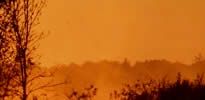 |
|
You Don't Have to Do It Alone ST MARTIN'S ESSENTIAL BOOKS, July 16, 2024 Full of heartrending stories, timeless wisdom, and hard-won insights from the author himself, You Don't Have to Do It Alone reminds us that friendship is a noble endeavor. Order from an online bookseller:
Amazon
BOOK DESCRIPTION About his new book, Mark Nepo says, "After a lifetime of trying to be a good friend, I wrote this book to affirm the spirit of friendship, to praise what it takes to love another well, and to show that - despite what we've been taught - you don't have to do it alone. It was Ralph Waldo Emerson who said, 'A friend may be reckoned the masterpiece of nature.' This book explores why and how this is true." Friendship is indispensable. In truth, we may discover our dearest friends in a moment of feeling vulnerable, or when feeling safe in the care of some trusted other, or in the dark labyrinth of seeking truth together. We often come upon enduring friends when taking the long way home, when humbled to put down our differences and forced to admit that we haven't a clue where we're going or how to get there. In the raw and tender space of such honesty, the power of friendship is revealed. In his latest book, Mark looks closely at the discovery of our kinship, the nature of friendship, the inevitable trials by which our bond is strengthened or broken, the acceptance of our humanness, and the conduit that lasting friendship becomes to the larger forces of life. Journey here and learn how the power of friendship can enrich your life.
EXCERPTS A CLEARING IN THE FOREST Friendship worthy of its name depends on how we show up for each other, and how we're changed for staying on the journey with one another, no matter where life takes us. Spiritual friendship requires the same commitment, but roots itself in a common recognition of the underlying Oneness of Life. There is a felt understanding that all things are connected and interdependent. And a further commitment, by various passions, to bring all things together. This leads to a kinship that can withstand the surprise of circumstance and the entanglements that snare us. We may discover our dearest friends in the dark labyrinth of seeking truth. In a moment of feeling vulnerable, we may feel safe in the care of some trusted other. We often come upon our deepest friends when taking the long way home, when forced to put down our differences, when humbled to admit that we haven't a clue where we're going or how to get there. In the raw and tender space of such honesty, the work of friendship really begins. In truth, though millions have come and gone before us, no one knows how to live or how to make sense of the arduous journey of being alive. It only gets easy when we care for each other and dare to share what we see and perceive in the midst of beauty or pain. For when we summon the courage to reach inside each other's heart, we touch the common center of all hearts. To receive in this way reveals a bond that exists between all things. After all I've been through, I can honestly say, I'd rather be a good friend than a saint. I'd rather have my love be counted on than be brilliant. And I'd rather climb for the view together than dig for the truth alone. ENLARGING OUR SELF BY GIVING OF OUR SELF As a boy, growing up in Temuco, Chile, Pablo Neruda recalls being drawn to a fence in his backyard. Beyond it was an open field, which led to a part of the world he'd never seen. There was an irregular hole in the fence, large enough for a child's hand. No matter where his play took him, he wound up at the hole in the fence, peering into the rest of life, waiting beyond his childhood. One day, as he looked through the hole, the hand of another boy appeared, as if it were his double calling him into the larger world. Neither boy said a word. Finally, the floating hand reappeared through the hole, offering a small toy, a white, fluffy sheep. Little Pablo accepted the gift from the other side with glee. He immediately wanted to give something back. This, he would later understand, is the urge of heart that allows us to grow - the urge to give something back. He looked through his small room and found a pinecone. Yes, this would be a good gift with its sweet, musty fragrance. The next day, he put his hand with the pinecone through the hole in the fence. And sure enough, the anonymous boy accepted Pablo's gift. He never saw the other boy again. These fundamental exchanges - looking for openings through which to glimpse the Whole of Life, receiving what is offered there, and acting on the urge to give back - these gestures are at the heart of all friendship and poetry. ORANGE JUICE When in the safety of true friendship, we often rediscover who we are and those we love. As years roll by, it's no surprise that we lose sight of the things closest to us - most of all loved ones. Not that we stop loving them in the day to day, but we lose the larger context of their depth and beauty, which is so striking when first meeting. Luckily, the tides of experience throw us about until we chance to re-see those we love freshly. Much of our anguish and isolation comes from not having the courage to admit openly to the mess and tenderness of our humanity. In truth, I have lost friends when they or I have hidden who we are. For our inborn response to tenderness is to be tender. Who has seen a baby bird and not had the impulse to hold it? And who has glimpsed a tender heart and not had the impulse to quiet its tremor? In the depths of my cancer journey, my old friend, Cindy, came to visit, as she had done for days, checking in, walking gingerly around the dark specter of death that was lingering in my livingroom. Every visit, she'd listen and not know what to say, and I was awkward at asking for what I needed. At the end of every visit, I'd see her to the door and we'd both tear up and she would say, "If there's anything you need, please, just ask." I would always thank her but was hesitant to make a request. Finally, this one day, we were at the door and I took her to me and said, "Just hold me." After a long embrace, I admitted, "I don't want to die." She cupped my face and said, "I don't want you to die." We both laughed and I uttered, "Orange juice." She said, "What?" I said, "I need orange juice." She was elated and repeated my request, "Orange juice! Yes! Orange juice!" It was the simplest of things, which, of course, would solve nothing, but which did keep us going because it gave us something simple to hold onto. I learned that day that to come out of hiding allows us to be there for each other in big ways and small. I learned that day that the chance to confront our mortality and admit to our fragility is the basis of all friendship. THE ESSENCE OF ANOTHER Being lonely, we long to find the deep company of another, truth to truth. Wanting to know our own essence, we keep looking for ways to lift up the essence of others. Yet when we glimpse the bare truth of another, we often become frightened and look away or deny that it has happened. Still, under all our human diversions, there is a light in each of us that wants to come out, that needs to shine, that has to give of itself for us to feel that life has meaning. And so, we approach and avoid each other until some great instance of wonder or pain makes us open up for good. Loved ones help us find and refind the light that we carry. Loved ones help us know and accept the truth in each other. Once we grasp the essence of another, we have an obligation to honor and carry what we know to be true about that person, into the world, while they live and when they die. Honoring and carrying the essence of another is the deepest kind of love, the deepest kind of friendship. This is how the sea loves the shore and how the sun loves all it shines on. While we perish and vanish from the Earth, our love never dies. It illumines the next world.
Reviews If you are moved. That is how my friend, Mark Nepo, asked if I would want to make a statement about his new book about friendship. I am moved by Mark Nepo. I am moved by his words and ideas. I am moved by my friendships that nourish me. Friendship is the music of my life. Like the lyrics of any great, old song, when I connect with a friend, regardless of the time separated, I fall right into the rhythm and memory of intimacy and sharing and I am always better for it. Mark explores this in the way that only Mark Nepo can. Intricate yet understandable. Sustained and yet immediate. The shared sight of each other's souls. Friendship, beautiful friendship. In this eloquent, essential compendium of friendship, Mark Nepo offers a roadmap to platonic intimacy in an age of increasing loneliness. Full of heartrending stories, timeless wisdom, and hard-won insights from the author himself, You Don't Have to Do It Alone reminds us that friendship is a noble endeavor - "the vocation of seeking truth together" - that deepens the soul and enriches our lives immeasurably. I loved it. Mark Nepo is one of our most gifted poets, essayists, and spiritual guides. His vulnerable, hopeful and beautifully-written books have made him feel like a soul friend to millions who've never met him. As one who's had the privilege of a long-time friendship with Mark, I can attest that friendship is not just another topic for him: it's the fabric of his life, a fabric of mutual support and blessing with people near and far. Now he's written a book that will help us deepen the friendships on which we depend. Amid the challenges of being fully human in our era, how reassuring to be reminded that we don't have to do it alone! Just as we often take the air we breathe for granted, so too can we forget how miraculous friendships can be. In this deeply insightful book, Mark Nepo shows us how to develop and cultivate these crucial relationships. We are all better people for reading Mark's work, and in this wise guide to platonic love, he has written about one of the most important subjects yet. After working with thousands of people seeking their purpose and in deep life transitions I believe that You Don't Have to Do It Alone speaks to a thorn in the heart of our collective consciousness: that we are lonelier than ever. This book is a tonic for making friendship a lifelong practice. A trove of wisdom on the nature of friendship. A call to reflect on your own friendships in a world where, for many of us, loneliness threatens our wellbeing, our livelihoods and our lifespans. This is a book to return to, be taught by, inspired by, guided by. This is a book to make friends with. What an exquisite act of friendship this beautiful book is. It is also "medicine in words," to quote the author, offering the most hesitant among us ways to welcome the appreciation and authenticity that are friendship's most enduring gifts. I would not be the poet or human being I am without the daily friendship of Mark Nepo's healing words. Every one of his books has become a companion on the journey, his teachings drawn from the deeper well of his own hard-won wisdom. I will read You Don't Have to Do It Alone again and again, each time I need to remember the "inlets of care" in which we discover "the depth of who we truly are." Savor this new book in the morning before your day begins, or at night before sleep, and see how connection and wonder will open your heart, and fill it to the brim. As one of the world's preeminent spiritual guides, Mark Nepo illuminates the nuanced facets of friendship, offering us a window into the mysterious goodness, profound truth, and exquisite beauty that can be found within these life-giving relationships. Engaging in his work is a gentle reminder of all that is meaningful. Mark Nepo's You Don't Have to Do It Alone guides us through an understanding of what it means to be a friend, to have a friend, and the sheer energetic pull of friendship itself. With his poetic, insightful words, and stories, he feeds us a meal so rich and luscious that it requires us to taste, savor and embody what he so delicately and caringly serves. The impact this book delivers is something I will feel for years to come. I loved this book! You Don't Have to Do It Alone illuminates the miraculous nature of friendship and the exquisite gifts that our kindred relationships offer. I am grateful for the chance to gift this book to my most beloved friends. Mark's work and words have become a steady companion along the way; his books, a transformative treasure in my life. Mark's book is a brilliant invitation to cozy in on a couch with soft slippers surrounded by friends as together you discuss love, friendship, and community. His gentle approach to asking one to contemplate a new idea is powerful and filled with love. Read this one for your soul.
A CONVERSATION WITH MARK ABOUT HIS NEW BOOK , You Don't Have to Do It Alone: The Power of Friendship QUESTION: What are you trying to explore with this book? QUESTION: Can you describe the journey this book takes us on? QUESTION: When did you first become aware of the importance of friendship? QUESTION: Can you say more about the nature of spiritual friendship? This leads to a kinship that can withstand the surprise of circumstance and the entanglements that snare us. We may discover spiritual friends in the dark labyrinth of seeking truth together. Or, in a moment of feeling vulnerable, we may feel safe in the care of some trusted other. We often come upon our deepest friends when taking the long way home, when forced to put down our differences, when humbled to admit that we haven't a clue where we're going or how to get there. In the raw and tender space of such honesty, the work of friendship really begins. QUESTION: You emphasize how important it is for friends to show up for each other. Can you give a personal example of a friend showing up for you? I learned later that my dear friend John had pushed his way in to see my neurosurgeon and said, "I'll drive the sample myself!" And he did just that, racing down the New York State Thruway with tissue from my skull in a cooler beside him. Without knowing of his kindness, I slept in the hospital. John died eighteen years ago from his own journey with cancer. I think of him often and thank him just as often. I often send the beat of my heart to John somewhere on the other side. John's love taught me that though no one can cross the sea of trouble for you, friends are oars. QUESTION: Can you share an insight you've learned about friendship from writing this book? Friendship has always been a potent resource released by giving. The way cave people would rub sticks together to create fire, we have always been able to spark friendship by sharing our humanity. In Ancient Greece, friendship was a topic of moral philosophy greatly discussed by Plato, Aristotle, and the Stoics. Openness in friendship was seen as an enlargement of the self. That we can enlarge our self by giving of our self is the paradox of deep relationship. Often, we are challenged to give when we feel we have no more to give. Or listen when we feel we have no more room to hear. Or to be patient with others when we feel we can't withstand them one more minute. Clearly, there are times when boundaries are necessary, but just as often, it is through these interpersonal junctures that we discover the depth of who we truly are. Nothing draws us through these thresholds as powerfully as our love of others. QUESTION: How does friendship come into play in such a time of polarization and acrimony? QUESTION: What is your hope for anyone engaging with this book? |



|
